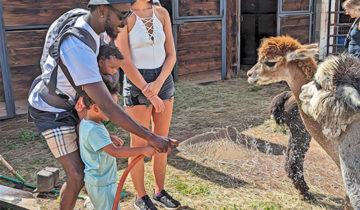High quality alpaca adventures and vacation recommendations in Colorado: All members of your group will have the opportunity to participate in a fully interactive experience. It typically lasts around 1 hour and 30 minutes. Its environment is ideal for nature lovers : Most people who live in Colorado love the outdoors because the state offers a little bit of everything. Even if you’re just visiting for the weekend, you can embrace all that nature has to offer. An alpaca ranch offers stunning scenery and a relaxing atmosphere where you can take in the fresh air. Are you looking for an educational opportunity for your kids? Come enjoy an alpaca experience that’s not only fun but also informative. This alpaca experience takes place on a fiber farm. This type of farm raises animals like alpacas, sheep, goats, llamas, angora rabbits, and more for their fleece and wool. Discover even more details at alpaca adventures package in Colorado.
For many years, zoologists assumed alpacas and llamas had descended from guanacos, and they were classified in the genus Lama. However, in a 2001 paper titled “Genetic analysis reveals the wild ancestors of the llama and the alpaca” in the journal Proceeding of the Royal Society B, researchers showed there is “high genetic similarity” between the alpaca and the vicuña, and between the llama and the guanaco. They recommended that the alpaca be reclassified as Vicugna pacos.
How much space does it take to raise an alpaca? Alpacas are environmentally friendly and require less pasture and food compared to other livestock. Stocking density impacts the health of the animal, so owners are encouraged to carefully assess their space. Vegetation, access to food and water, and shelter are some factors that influence the amount of space needed. Consult with your local agriculture authorities and breeders for specific recommendations for your area. Are alpacas clean animals? Yes, they are much cleaner than most livestock. Alpacas have a minimal aroma and tend to attract fewer flies in the summertime than other forms of livestock. Alpacas often defecate in communal dung piles. There may be three or four of these areas in a pasture. This makes for easy clean-up, reduced opportunity for parasites, and better overall hygiene in the herd.
Wild guanacos and vicuñas live in a wide range of habitats, from the high and dry Atacama Desert in northern Chile to the wet and stormy Tierra del Fuego at the southern tip of the continent, according to the ADW. Alpacas are also native to the Andes, at elevations of up to 15,750 feet (4,800 meters). Alpacas, however, are very adaptable and have been exported all over the world, including the United States, New Zealand, Australia and the Netherlands, so their “habitat” is often farmland. Still, 99 percent of the world population of alpacas is found in South America, according to the ADW.
Are alpacas an “exotic species,” or are they considered simply “livestock?” Alpacas have been raised as domestic livestock for thousands of years. Since the end-product of alpacas is their fleece, like sheep, they are classified as livestock by both the United States and Canadian federal governments. Do alpacas spit? All members of the camel family use spitting as a means of negative communication. They do get possessive around food, and may express annoyance by spitting at other alpacas that they perceive are encroaching on “their” food. Also, they often spit at one another during squabbles within the herd (usually involving two or more males). From time to time alpacas do spit at people on purpose, but it is more common that humans get caught in the crossfire between alpacas, so it’s best to study their behavior and learn to avoid the most vulnerable situations.
Get ready for an Alpaca Adventure ! A Wildly Immersive and Hilarious Alpaca Adventure Perfect For All Ages : Embark upon an unforgettable magical experience with affectionate Alpacas, and explore the scenic mountain views of Red Rocks Park. We offer truly unique experiences that gets you up-close with these majestic friends. You’ll be entertained and educated on their habits, diets, and life on the ranch as you discover what makes these creatures so special. Discover additional info on https://meetalpacas.com/.
Are alpacas easy to train? Alpacas are very smart animals and are fairly easy to train. It is best to start training them when they are young so that they will accept a halter and learn to follow on a lead. Many owners also enjoy training them to walk through obstacles. Some even compete with their alpacas at shows where they walk over, through, and around objects and also jump over small hurdles. Also, it is helpful to train alpacas to ride in a trailer or van if they ever need to be transported to a show or another farm. Alpacas are easy to transport, as they normally cush (lay down with their legs folded under them) when traveling. Be aware that alpacas should not be tied up when traveling.



